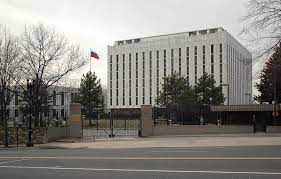Russian Embassy in US lashes out at Meta for okaying hate speech against Russians

Meta, the US-based tech conglomerate that runs Facebook and Instagram, greenlighting calls for violence against the Russian military testifies to the fact that an information war has been declared on Russia, the Embassy of the Russian Federation in Washington DC said in a statement published on Thursday.
“We paid attention to the Reuters message about the permission of the Meta corporation to post calls for violence against the Russian leadership and our military personnel on #Facebook and Instagram,” the diplomatic mission said. “Meta’s aggressive and criminal policy leading to the incitement of hatred and hostility towards Russians is outrageous,” the embassy emphasized, “The company’s actions are yet another evidence of the information war without rules declared on our country. Media corporations have become soldiers of the propaganda machine of the Western establishment.”

“We demand that the US authorities stop the extremist activities of Meta and take measures to bring the perpetrators to justice,” the statement said, “Users of Facebook and Instagram did not give the owners of these Internet platforms the right to determine the criteria of truth and pit nations against each other,” the Russian Embassy tweeted.
Earlier, Reuters, citing an internal Meta newsletter, reported that in some countries, Facebook and Instagram would not block users’ calls for violence against citizens of the Russian Federation, especially against the military. According to its information, Meta’s emails indicate that incitement to violence against Russians are allowed when the message explicitly refers to the special military operation in Ukraine. The company’s policy changes apply to Armenia, Azerbaijan, Estonia, Georgia, Hungary, Latvia, Lithuania, Poland, Romania, Russia, Slovakia and Ukraine. According to the agency, the company will also temporarily refrain from removing posts calling for the death of Russian President Vladimir Putin and his Belarusian counterpart Alexander Lukashenko in Poland, Russia and Ukraine.
Meta later acknowledged that it had temporarily permitted incitement to violence against the Russian military in light of the special military operation in Ukraine. Company spokesman Andy Stone wrote on Twitter that they “temporarily allow forms of “political expression” that would normally violate their [the company’s] terms of service, including “violent speech,” and threats against the Russian military. He added that inciting brutality against Russian civilians would remain banned, but did not explain exactly how such violations would be moderated or detected under such policy changes.
Russian President Vladimir Putin said in a televised address on February 24 that in response to a request by the heads of the Donbass republics he had made a decision to carry out a special military operation. After that, the US, the EU, the UK and a number of other states announced that they would impose sanctions against Russian legal entities and individuals.
TASS








